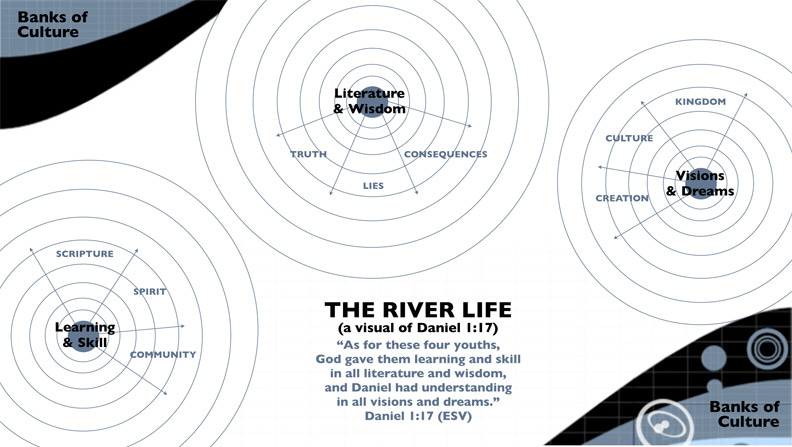Christian Education: A Summary & Visual
A summary of brief study from the life/book of Daniel on God as Master Teacher:
“And as for these four youth...” (student)
Who are our students as people and as products of their culture(s)?
Where are our students in terms of historical and cultural contexts - geographical, economical, political, technological?
When are our students - mentally, emotionally, physically, socially, spiritually - with regard to developmental theory?
“...God gave them...” (teacher)
Who is God as Master Teacher, and who does He call us to be as teachers?
“...learning and skill...” (pedagogy)
How does God’s initiation and generosity come into play through cognitive (learning) and experiential (skill) means?
How has God already gifted learning aptitude, facilities, and styles through Scripture, Spirit, and Community?
“...in all literature and wisdom...” (curriculum)
What is God’s program of study and how do we use the Scriptures to discern culture’s truth, lies, and consequences?
“...and Daniel had understanding...” (assessment)
How and when will we assess our students’ comprehension?
“...in all visions and dreams.” (purpose)
Why will our students prayerfully consider and pursue God’s purposes, ideas, and goals on behalf of creation, culture, and the Kingdom?
How can our students benefit from our examples of prayerfully considering and pursuing the same purposes?
Daniel 1:17 and the River Life: A Metaphor
Having walked through a brief biblical exposition and summary of our application, perhaps a visual interpretation of the text would be beneficial. Let's use the metaphor of a river – what we'll call the River Life – as an illustration of our humanity.
Like human nature, the nature of a river is not stagnant; its waters move, change, and blend. Again like human nature, a river is not dichotomized; no divisions separate it into parts. In sum, our lives are neither static nor partitioned, but dynamic and fluid – shaped by the banks of culture even as we, at particular times and by God’s grace, shape them.
As alluded in Daniel’s story, God enables us in our educational capacities; He gives us learning and skill in initially understanding the how of the what. He does this through his Scripture, his Spirit, and his community (the Church), all of which create their own “ripple effect” within the waters of our fallenness, educating and enabling us to affirm what is good, to challenge what is not, but never to withdraw from the river altogether.
At the same time, as a result of his Creator image within us, humanity creates a variety of “literature and wisdom” flowing from our collective experience. However, whereas everything God creates is good (1 Timothy 4:4), our works are blemished because of our sin and are manifest in the world as “truth, lies, and consequences.” The “ripple effect” of all our created works is not without negative taint, but by God’s common grace, neither is it all without beauty or value.
God directs the River Life to flow through the banks of culture, shaping them as it goes. Because God calls us to think Christianly and care about His world, He drops stones of learning and skill and literature and wisdom as means to teach us when, where, how, and why, and to help us understand “visions and dreams” - the ones He gives to us as His children - for the good of creation, culture, and Kingdom.
Christian education, then, as outlined in Daniel 1:17, is given by God, engages the world, and applies redemption to it – all while redeeming His chosen agents of redemption as well. This is our understanding from the Scriptures, and this is the worldview that both drives and powers our classical education methodology.




